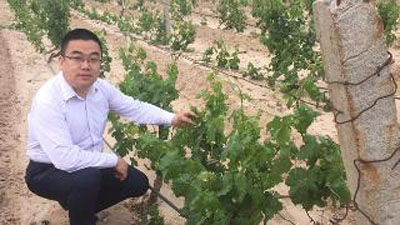China vineyard Helan Mountain near Yinchuan sees bright future
Date£º
2015-06-25 16:14 Source£º
The Weekly Times Author:
ED GANNON Translator:
In the desert sands of central China, the first sprouts of a potential giant is emerging.

Helan Mountain general manager Min Hua in the vineyard. Source: The Weekly Times
The Chinese wine industry is slowly gaining a foothold in a domestic market that has, until now, been dominated by foreign wine.
But with more affluent Chinese consumers turning to wine, the future looks ros¨¦ for both Chinese and Australian wine producers.
Much of China¡¯s local wine is emerging from Ningxia Province, which sits in the geographical centre of China.
With sandy soils, a mild climate, 200mm annual rainfall but access to irrigation, and abundant sunshine, the region has been found to be excellent for growing both white and red grape varieties.
TOP DROP
LEADING the charge is French company Pernod Ricard Winemakers, which also owns the famous Australian brand Jacob¡¯s Creek and New Zealand¡¯s Stoneleigh and Brancott Estate sauvignon blanc wine labels.
Read more
The company¡¯s 400ha Helan Mountain vineyard, near Yinchuan, produces 60,000 dozen bottles of mainly merlot and cabernet sauvignon annually from its shiraz vineyard.
About 85 per cent of the vineyard¡¯s production is red wine, with chardonnay also produced.
The winery¡¯s premium wine is Xiao Feng, a dry red. The first release was the 2010 vintage, hitting the market in 2013.
The vineyard is actually on the Gobi Desert, with planting beginning in 2007 under the guidance of chief consultant winemaker Philip Laffer, a 50-year veteran and doyen of the Australian industry. The company describes Philip as the ¡°soul¡± of Helan Mountain.
His work has been carried on by Craig Grafton, who can count on extensive experience from the Barossa, Clare and Yarra valleys.
TOP SHELF
FROM such sandy beginnings, Helan Mountain is now recognised as one of the shining lights of the Chinese industry, its reds gracing the cellars of top-end Beijing restaurants.
¡°Our wine is suitable for everyone, said Helan Mountain general manager Min Hua, pointing to the vineyard¡¯s 174 local and international awards.
Min said the importance of Australian winemakers to his vineyard and to the overall burgeoning Chinese industry could not be overstated.
¡°The Australian winemakers we have, have very technical techniques,¡± he said.
¡°The focus here is on good planting, but the winemaker is the tool to making good wine.¡±
He said his company put great emphasis on importing the best vine stocks, with China normally importing stocks from Europe.
The vines on the Yinchuan winery come from France.
¡°France and China are on the same latitude,¡± he explained. ¡°We tried to import stocks from Australia but it was too difficult to get through quarantine.¡±
SWEET DREAMS
THE sandy soil of the region, coupled with 3000 hours of sunshine each year, produced high sugar and acid levels in the grapes, Min said.
For now, the vineyard¡¯s target is quality, not quantity, hoping to eventually build production to spread beyond China.
¡°The main market is the China market, but we are looking at the global market,¡± Min said.
He declared China could ¡°definitely¡± be a major wine maker.
¡°Forty years ago nobody thought Australia could produce premium wines,¡± Min said.
¡°Still, we need a little more time.¡±
Min said the challenge was to get Chinese people to choose quality wines to drink. ¡°Quality will be key,¡± he said.
He said the palate of Chinese people was changing, as were their spending habits.
¡°More and more young people are looking for a low alcohol drink. Wine is a lower risk than spirits.
¡°The young generation and the middle class are starting to enjoy life, drinking good wine and travelling.¡±
HERE¡¯S CHEERS
THE Chinese wine industry did not feel threatened by the influx of Australian wine into the domestic market, Min said.
¡°We are a big family,¡± he said.
¡°They have different flavours and it is an open market.
¡°We have a chance to enjoy wine from France, Australia, New Zealand, so why not.¡±
Min said there were 500 wineries now in China, with ¡°a lot¡± of premium wine makers.
Ningxia Province has 78 wineries and the goal of local authorities is to increase that to 100.